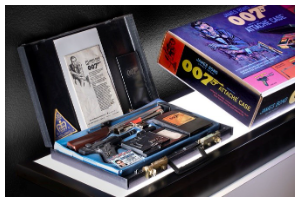ATOMIC MUSEUM NEW “SPY” EXHIBIT WITH THE NATIONAL CRYPTOLOGIC MUSEUM

FOR IMMEDIATE RELEASE
 L to R: James Bond 007 Attaché Case located within the SPY Exhibit at Atomic Museum; SPY Exhibit at the Atomic Museum.
L to R: James Bond 007 Attaché Case located within the SPY Exhibit at Atomic Museum; SPY Exhibit at the Atomic Museum.
(Photos courtesy of Chris Wessling for the Atomic Museum)
ATOMIC MUSEUM DEBUTS NEW “SPY” EXHIBIT IN PARTNERSHIP WITH THE NATIONAL CRYPTOLOGIC MUSEUM
Exhibit Examines Mystery of Cold War, Intrigue Seen in Hollywood Films
Click Here for Downloadable, High-Res Photos, B-Roll
LAS VEGAS (February 2023) – Now open inside the Atomic Museum is “SPY,” the brand-new exhibit examining the mystery of the Cold War and intrigue seen in Hollywood Films. Created in partnership with the National Security Agency’s (NSA) National Cryptologic Museum in Fort Meade, Maryland, this boutique exhibit explores the covert intelligence gathering from that era.
“SPY” spotlights how the NSA’s gathering of telemetry intelligence, which is used to obtain data on the internal functioning of missiles and space vehicles being tested by foreign governments, allowed the United States to keep pace with ever-changing technology. Several artifacts relate to ensuring compliance with START I, which was the bilateral treaty signed in 1991 between the United States and the Soviet Union regarding the reduction and limitation of strategic offensive arms.
Museum guests also have the opportunity to see the tools used by American intelligence to monitor Soviet activities during the Cold War. American and Soviet artifacts on display include TELINT, RISSMAN and SLBM systems that both countries employed to collect and process top-secret data. Additionally, courtesy of a special loan by the National Cryptologic Museum exclusively for this exhibit, the Atomic Museum presents the Enigma Machine, a cipher device used by the German military command to encode strategic messages before and during World War II.
Artifacts include:
- The RISSMAN Telemetry Processing System, which dates from the early 1980s and was vital to the signals-intelligence (SIGINT) mission until the end of the Cold War. Magnetic tape recordings of the intercepted signals were then sent to NSA’s National Telemetry Processing Center for processing.
- Telemetry intelligence (TELINT) signal collection position from the early 1970s, which is part of the ANDERS collection facility. This collection of equipment was called HARDBALL and a typical collection system would receive, display and convert several signals before recording them on magnetic tape and forwarding them to NSA.
- Russian carrying case for Soviet/Russian telemetry tape roll.
- Russian/Soviet electronic circuit board used in accordance with the START Treaty.
- Russian circuit board used by NSA for the verification of compliance with the START treaty. Although it used 1970s technology, this Russian circuit board was used in their telemetry data processing equipment from 1994 to 2009. This equipment was used by NSA for the verifications of compliance with the START Treaty.
- Russian-built data processing system used for analysis of submarine-launched ballistic (SLB) missile test telemetry data and for verification of compliance with the START Treaty.
“SPY” is open during regular museum hours from 9 a.m. to 5 p.m. daily. For more information about the Atomic Museum or to purchase tickets, visit atomicmuseum.vegas.
ABOUT THE NATIONAL CRYPTOLOGIC MUSEUM
The National Cryptologic Museum (NCM) is the National Security Agency’s gateway to the public and educates visitors about the role of cryptology in shaping history. The NCM collects, preserves and showcases unique cryptologic artifacts and shares the stories of the people, technology and methods that have defined cryptologic history.
ABOUT THE ATOMIC MUSEUM
The Atomic Museum is operated and maintained by its parent company, the Nevada Test Site Historical Foundation (NTSHF), an IRS 501(c)3 charitable, non-profit organization chartered in Nevada. The Atomic Museum is one of 37 museums designated as an Affiliate Partner of the Smithsonian Institution and is a repository for one of the most comprehensive collections of nuclear history in the world. Covering nuclear history beginning with the first test at the Nevada Test Site on January 27, 1951, the Atomic Museum’s exhibitions and programming also address current affairs related to the nuclear industry. For more information, go to atomicmuseum.vegas and follow on Facebook, Instagram and Twitter.
MEDIA CONTACTS:
Desiree Vontur/Erika Pope
The Vox Agency
desiree@thevoxagency.com, erika@thevoxagency.com
(702) 569-0616, (702) 249-2977
# # #

